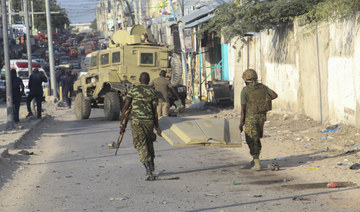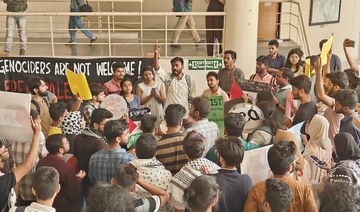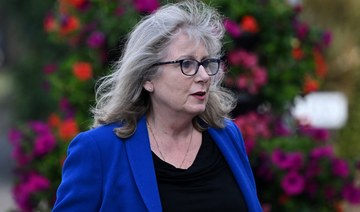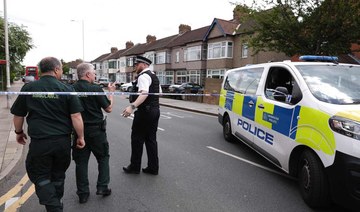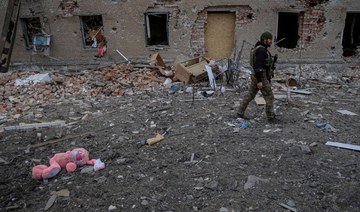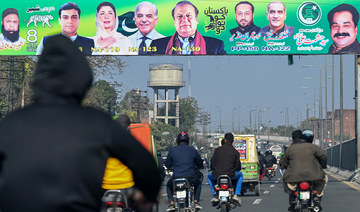OUAGADOUGOU: Eleven soldiers were wounded and 29 militants neutralized in a weekend attack on security forces in Burkina Faso’s troubled northwest, the army said on Sunday.
Military and police units came under attack on Saturday in the area of Gomboro “by armed individuals,” the army said.
“The fighting caused injuries to 11 soldiers who were treated. Their response and counter-offensive allowed the neutralization of 29 terrorists and the recovery of a large amount of combat materiel including weapons, vehicles and communication equipment,” the statement said.
On December 23, an ambush by suspected extremists targeting civilians and the VDP, an official self-defense force, in the northern You region left 41 people dead, including Ladji Yoro, considered a leader of the VDP.
That attack was the deadliest since the bloodshed in Inata in the country’s north in mid-November, which claimed 57 lives including 53 police officers.
Since 2015, Burkina Faso has been facing regular and deadly attacks, particularly in the northern and eastern regions, close to Mali and Niger, countries also battling armed extremist groups.
These attacks, often coupled with ambushes and attributed to extremist movements affiliated with the Daesh group and Al-Qaeda, have killed more than 2,000 people and forced more than 1.4 million to flee their homes.
Eleven troops hurt, 29 militants neutralized in Burkina: army
https://arab.news/ppusu
Eleven troops hurt, 29 militants neutralized in Burkina: army
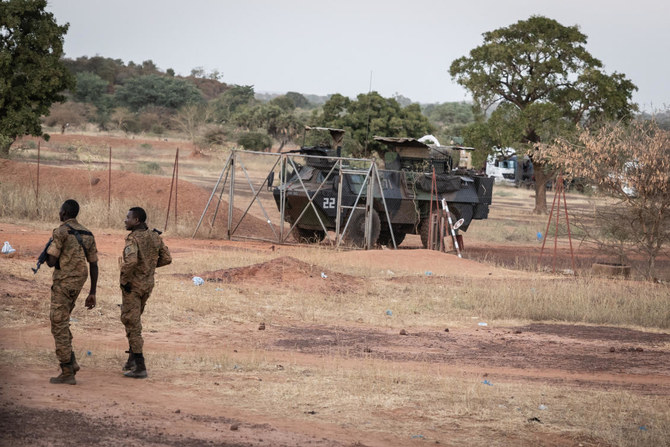
- Since 2015, Burkina Faso has been facing regular and deadly attacks, particularly in the northern and eastern regions
California police move in to dismantle pro-Palestinian protest camp at UCLA

- The pre-dawn police crackdown at UCLA marked the latest flashpoint for mounting tensions on US college campuses
- Live TV footage showed about six protesters under arrest
LOS ANGELES: Hundreds of helmeted police muscled their way into a central plaza of the University of California at Los Angeles early on Thursday to dismantle a pro-Palestinian protest camp attacked the previous night by pro-Israel supporters.
The pre-dawn police crackdown at UCLA marked the latest flashpoint for mounting tensions on US college campuses, where protests over Israel’s conduct of the war in Gaza have led to student clashes with each other and law enforcement.
Live TV footage showed about six protesters under arrest, kneeling on the ground, their hands bound behind their backs with zip-ties.
Dozens of loud explosions were heard during the clash from flash-bang charges, or stun grenades, fired by police.
Demonstrators, some carrying makeshift shields and umbrellas, sought to block the officers’ advance by their sheer numbers, while shouting, “push them back” and flashing bright lights in the eyes of the police. Others on the opposite side of the camp gave up quickly, and were seen walking away with their hands over their heads under police escort.
Around sunset on Wednesday, officers in tactical gear had begun filing onto the UCLA campus and taking up positions adjacent to a complex of tents occupied by throngs of demonstrators, live footage from the scene showed.
Local television station KABC-TV estimated 300 to 500 protesters were hunkered down inside the camp, while around 2,000 more had gathered outside the barricades in support.
But the assembled police stood by on the periphery for hours before finally starting to force their way into the encampment around 3:15 a.m. PDT (1015 GMT), tearing down barricades and arresting occupants who refused to leave. The raid was led by a phalanx of California Highway Patrol officers carrying shields and batons.
Some of the protesters had been seen donning hard hats, goggles and respirator masks in anticipation of the siege a day after the university declared the encampment unlawful.
Prior to moving in, police urged demonstrators in repeated loudspeaker announcements to clear the protest zone, which occupied a plaza about the size of a football field between the landmark twin-tower auditorium Royce Hall and the main undergraduate library.
An initial group of Los Angeles police officers who briefly entered a corner of the camp were overwhelmed by demonstrators and forced to retreat, before reinforcements arrived by the busload about an hour later.
Violent clash precedes crackdown
UCLA had canceled classes for the day on Wednesday following a violent clash between the encampment’s occupants and a group of masked counter-demonstrators who mounted a surprise assault late Tuesday night on the tent city.
The occupants of the outdoor protest camp, set up last week, had remained mostly peaceful before the melee, in which both sides traded blows and doused each other with pepper spray.
Members of the pro-Palestinian group said fireworks were thrown at them and they were beaten with bats and sticks. University officials blamed the disturbance on “instigators” and vowed an investigation.
The confrontation went on for two or three hours into early Wednesday morning before police restored order. A spokesperson for California Governor Gavin Newsom later criticized the “limited and delayed campus law enforcement response” to the unrest as “unacceptable.”
As the much-expanded police force entered the campus on Wednesday night to clear the encampment, some of the protesters were heard yelling at them, “Where were you yesterday?“
Taylor Gee, a 30-year old pro-Palestinian protester and UCLA law student, said the police action felt “especially galling” to many protesters given the slow police response a night earlier.
“For them to come out the next night to remove us from the encampment, it doesn’t make any sense, but it also makes all the sense in the world.”
Protests at schools across the US
UCLA officials said the campus, which enrolls nearly 52,000 students, including undergraduates and graduate scholars, would remain shuttered except for limited operations on Thursday and Friday.
The protests follow the Oct. 7 attack on southern Israel by Hamas militants from the Gaza Strip and the ensuing Israeli offensive on the Palestinian enclave.
Students have rallied or set up tent encampments at dozens of schools across the US in recent days, calling for an immediate ceasefire in Gaza and demanding schools divest from companies that support Israel’s government. Many of the schools have called in police to quell the protests.
The demonstrations across the country have been met with counter-protesters accusing them of fomenting anti-Jewish hatred. The pro-Palestinian side, including Jews opposed to Israeli actions in Gaza, say they are being unfairly branded as antisemitic for criticizing Israel’s government and expressing support for human rights.
The issue has taken on political overtones in the run-up to the US presidential election in November, with Republicans accusing some university administrators of turning a blind eye to antisemitic rhetoric and harassment.
Wednesday night’s police action came a day after police in New York City arrested pro-Palestinian activists who occupied a building at Columbia University and removed a tent city from the campus of the Ivy League school.
Police arrested a total of about 300 people at Columbia and City College of New York, Mayor Eric Adams said. Many of those arrested were charged with trespassing and criminal mischief.
The clashes at UCLA and in New York were part of the biggest outpouring of US student activism since the anti-racism rallies and marches of 2020.
Ninety pro-Palestinian demonstrators — students and outsiders — were arrested at Dartmouth University in New Hampshire on Wednesday, the Hanover Police Department said. They were charged with criminal trespass and resisting arrest.
India, UAE mark two years of free trade with 16% growth
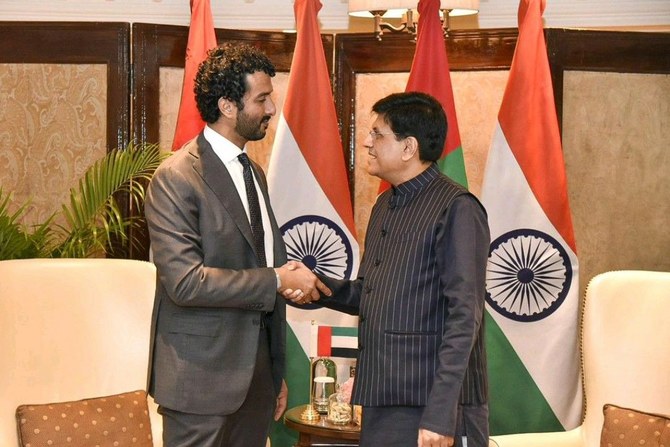
- Technology, innovation, and energy are main drivers behind the growth
- UAE ambassador welcomes increase in trade as ‘resounding success story’
NEW DELHI: A broad trade and investment pact signed by India and the UAE two years ago has boosted bilateral trade by 16 percent, with India’s top business body seeing growth, especially in the innovation, energy and technology sectors.
The Comprehensive Economic Partnership Agreement was signed by India’s Commerce and Industry Minister Piyush Goyal and UAE Economy Minister Abdulla bin Touq Al-Marri in February 2022.
It has been in effect since May 1, 2022, reducing tariffs on about 80 percent of all goods and providing zero-duty access to 90 percent of Indian exports.
The pact has since significantly advanced bilateral exchanges, as they registered a year-on-year increase of more than 16 percent, according to data from the Federation of Indian Chambers of Commerce and Industry, India’s largest and oldest trade association.
“In the first two years of CEPA’s operation, trade between the two countries has grown remarkably by 16.41 percent, showing an increase of total trade from $72.87 billion in 2021-2022 to $84.84 billion in 2022-2023,” FICCI Secretary-General S.K. Pathak told Arab News.
“Most of this growth has been registered in energy, infrastructure and construction, technology and innovation, pharma and healthcare, tourism and cultural exchanges.”
The agreement made the UAE emerge as India’s key partner in the Gulf Cooperation Council region, with both countries expecting to increase the total value of bilateral trade in non-petroleum products to over $100 billion and trade in services to $15 billion by 2030.
Citing the “growing importance of the trade relations between the two countries,” Pathak said the FICCI had “set up an office in Dubai to work closely with industry and government and support business to achieve the full benefits of CEPA.”
Supported by the UAE and Indian governments, the UAE-India CEPA Council was also established earlier this year to enhance investment, trade ties, and the implementation of the pact’s rules.
The UAE Embassy in India celebrated the second anniversary of the agreement with members of the business community in Mumbai, India’s financial hub.
UAE Ambassador Abdulnasser Al-Shaali welcomed the growth in bilateral commercial exchanges as a “resounding success story,” solidifying the long-standing economic ties between the two countries.
“Over the past two years, we have witnessed remarkable growth in bilateral trade, a testament to the immense potential that exists when our complementary strengths are harnessed effectively,” he said during the event on Wednesday.
“The CEPA has not only opened new avenues for businesses to benefit from the bilateral partnership but has also fostered deeper integration of our economies, paving the way for increased investment flows and collaboration across diverse sectors.”
London mayor accuses MP of ‘Islamophobia and anti-Muslim hatred’

- Lee Anderson recorded claiming Sadiq Khan ‘hates this country ... our heritage, our culture’
- Anderson claims he received support from Cabinet ministers after saying Khan controlled by ‘Islamists’
LONDON: The “Islamophobia and anti-Muslim hatred” of Reform UK MP Lee Anderson is “fuelling hate crime and violent threats,” London Mayor Sadiq Khan has said in a statement.
His comments come after ITV News released a secret recording of Anderson talking to party members at an event in which he claimed Khan “hates this country ... our heritage, our culture.”
The news also follows revelations ahead of the London mayoral elections on Thursday that Conservative candidate Susan Hall has followed social media pages and groups in which other people allegedly posted racist content and abuse aimed at the Muslim mayor.
Anderson was previously deputy chair of the Conservatives, but switched parties after he was suspended by Prime Minister Rishi Sunak for claiming that Khan was under the control of “Islamists” and had “given our capital city away to his mates.”
In the ITV recording, Anderson is heard saying former Conservative colleagues had offered him support and sympathy for his words, saying senior party officials had told him “you’re saying what millions of people are thinking up and down the country.”
While not naming anyone specifically, Anderson said: “At least two Cabinet ministers contacted me to say I’d been treated poorly.”
He added: “I would never betray the confidence of my colleagues, regardless of what political party they’re in, that was sent in confidence. A lot of those people who I sit opposite are still my friends.”
Khan said: “In the past 24 hours we have seen my Tory (Conservative) mayoral opponent endorsing Facebook groups rife with antisemitism, Islamophobia and death threats against me. And now we have a former Tory party deputy chair caught on camera being racist.
“It is deeply depressing that he confirms his Islamophobia and anti-Muslim hatred was cheered on by current Tory party staff, MPs and Cabinet ministers.”
Khan added: “It’s unpatriotic to talk down modern, diverse, brilliant Britain in this way. And it has real-world consequences, fuelling hate crime and violent threats.”
What is at stake in UK local voting ahead of a looming general election

LONDON: Millions of voters in England and Wales will cast their ballots on Thursday in an array of local elections that will be the last big test before a U.K. general election that all indicators show will see the Conservative Party ousted from power after 14 years.
Prime Minister Rishi Sunak will hope he can point to successes, notably in a couple of key mayoral races, to douse talk that the Conservative Party will change leader again before the United Kingdom's main election, which could take place as soon as next month.
On the other hand, Labour Party leader Keir Starmer will hope Thursday's local elections confirm what opinion polls have shown for two years — that Labour is on course for power for the first time since 2010.
“The national context going into these local elections is very good for Labour and very bad for the Conservatives,” said Rob Ford, professor of politics at the University of Manchester.
As is often the case in British local elections, the run-up is about expectation management, so any outperformance can be painted as a success.
That's certainly the case with the Conservatives, who are widely predicted to lose around half of the 1,000 seats they are contesting. They have pointed out, for example, that the equivalent elections were held in 2021 when the government of then Prime Minister Boris Johnson was riding high following the rollout of the coronavirus vaccines.
Thursday's elections are important in themselves — voters decide who will run many aspects of their daily lives, such as bin collections, the state of the roads and local crime prevention measures, for the coming years.
But with a general election looming, they will be viewed through a national prism.
Here are five things to know:
What's happening?
Voters in England and Wales will go to the polls for local, mayoral, and police and crime commissioner elections.
The voting is the final test of public opinion before the general election, which has to take place by January 2025 but which Sunak, who has the power to decide on the date, has indicated will be in the second half of 2024.
As well as a number of mayoral votes, including in London where Sadiq Khan is expected to win a third term, there are more than 100 elections to local councils and nearly 40 for local police and crime commissioners.
There's also a special parliamentary election in Blackpool South, a long-time Labour seat that went Conservative in the last election in 2019, when Johnson won a big victory. The results will be announced in coming days. London's mayoral result isn't due until Saturday.
No elections are taking place in Scotland or Northern Ireland, the other constituent nations of the U.K.
What's at stake for Sunak?
Potentially his job. Sunak replaced Liz Truss, who quit after 45 days following a budget of unfunded tax cuts that roiled financial markets and sent borrowing costs for homeowners surging.
Sunak, who warned about the economic implications of Truss' plan, was supposed to be a steady hand after taking the top job in October 2022. If opinion polls are right, he's not improved the Conservatives' ratings, which had even prior to Truss, been battered by the circus surrounding Johnson, who was ousted over a series of ethics scandals.
With the Conservatives seemingly headed for one of their biggest-ever electoral defeats, there's mounting speculation Sunak may face a leadership battle if Thursday's elections are really bad.
Key to his survival could be the mayoral elections in the West Midlands and Tees Valley in the northeast of England. Should Conservative mayors Andy Street and Ben Houchen hold on, he may win some respite from restive lawmakers in his party. Should both lose, he may face trouble.
Is Labour headed for power?
In historical terms, Labour has a mountain to climb if it's going to form the next government.
It's performance in 2019 was its worst since 1935. Starmer has tried to bring the party back to the center of British politics after the five-year leadership of veteran left-winger Jeremy Corbyn.
Starmer's cautious approach has clearly worked if opinion polls are anything to go by. But it's fair to say that enthusiasm levels are far lower than those that heralded the arrival of Tony Blair ahead of the 1997 general election.
That may be partly due to the more challenging economic backdrop, but Starmer, formerly a human rights lawyer, lacks the razzmatazz of his predecessor. Even so, Starmer will hope Labour notches up big wins in areas it lost under Corbyn, in the north of England and in the Midlands.
One point of concern is how many traditionally Labour supporters in Muslim communities fail to vote in protest at the party's stance over the conflict in Gaza.
Are voters being tactical?
One of the contributing factors to Blair's landslide victory in 1997 came from so-called tactical voting, whereby some voters put aside their preferred political party and back whoever they think is most likely to defeat the Conservative candidate.
Tactical voting has reemerged in recent years and could become key in the general election. It usually involves voters sympathetic to Labour in parts of the country, such as southwest England, backing the much-smaller Liberal Democrats and Liberal Democrat supporters loaning votes to Labour in the Midlands and the north of England.
Conservative lawmakers across the U.K., even in supposedly safe seats, will be hugely concerned if voters think more tactically.
Pincer from the right?
The Conservatives don't just face a challenge from the left. Reform UK is trying to outflank it from the right.
Though it is standing in a few seats, Conservatives will worry that support for the party will see Labour and others come through the middle.
Reform UK, which claims to be tougher on issues such as immigration and on Brexit, has said it won't stand aside to give incumbent Conservative lawmakers an easier chance at the general election, as its former incarnation, The Brexit Party, did in 2019. The Blackpool South special election will be particularly interesting on that front.
As India votes, misinformation surges on social media: ‘The whole country is paying the price’

- Tech companies like Google and Meta say they are working to combat deceptive or hateful content while helping voters find reliable sources
- Researchers say their promises ring hollow after years of failed enforcement, “cookie-cutter” approaches that fail to account for India’s diversity
NEW DELHI: Bollywood stars seldom weigh in on politics, so videos showing two celebrities criticizing Indian Prime Minister Narendra Modi — and endorsing his main opposition, the Congress party — were bound to go viral.
But the clips of A-list actors Aamir Khan and Ranveer Singh were fake, AI-generated videos that were yet another example of the false or misleading claims swirling online with the goal of influencing India’s election. Both actors filed complaints with police but such actions do little to stanch the flow of such misinformation.
Claims circulating online in India recently have misstated details about casting a ballot, claimed without evidence that the election will be rigged, and called for violence against India’s Muslims.
Researchers who track misinformation and hate speech in India say tech companies’ poor enforcement of their own policies has created perfect conditions for harmful content that could distort public opinion, spur violence and leave millions of voters wondering what to believe.
“A non-discerning user or regular user has no idea whether it’s someone, an individual sharing his or her thoughts on the other end, or is it a bot?” Rekha Singh, a 49-year-old voter, told The Associated Press. Singh said she worries that social media algorithms distort voters’ view of reality. “So you are biased without even realizing it,” she said.
In a year crowded with big elections, the sprawling vote in India stands out. The world’s most populous country boasts dozens of languages, the greatest number of WhatsApp users as well as the largest number of YouTube subscribers. Nearly 1 billion voters are eligible to cast a ballot in the election, which runs into June.
Tech companies like Google and Meta, the owner of Facebook, WhatsApp and Instagram, say they are working to combat deceptive or hateful content while helping voters find reliable sources. But researchers who have long tracked disinformation in India say their promises ring hollow after years of failed enforcement and “cookie-cutter” approaches that fail to account for India’s linguistic, religious, geographic and cultural diversity.
Given India’s size and its importance for social media companies, you might expect more of a focus, say disinformation researchers who focus on India.
“The platforms are earning money off of this. They are benefiting from it, and the whole country is paying the price,” said Ritumbra Manuvie a law professor at the University of Groningen in the Netherlands. Manuvie is a leader of The London Story, an Indian diaspora group which last month organized a protest outside Meta’s London offices.
Research by the group and another organization, India Civil Watch International, found that Meta allowed political advertisements and posts that contained anti-Muslim hate speech, Hindu nationalist narratives, misogynistic posts about female candidates as well as ads encouraging violence against political opponents.
The ads were seen more than 65 million times over 90 days earlier this year. Together they cost more than $1 million.
Meta defends its work on global elections and disputed the findings of the research on India, noting that it has expanded its work with independent fact-checking organizations ahead of the election, and has employees around the world ready to act in case its platforms are misused to spread misinformation. Nick Clegg, Meta’s president of global affairs, said of India’s election: “It’s a huge, huge test for us.”
“We have months and months and months of preparation in India,” he told The Associated Press during a recent interview. “We have teams working around the clock. We have fact checkers in multiple languages operating in India. We have a 24-hour escalation system.”
YouTube is another problematic site for disinformation in India, experts say. To test how well that video-sharing platform was doing in enforcing its own rules, researchers at the nonprofits Global Witness and Access Now created 48 fake ads in English, Hindi and Telugu with false voting information or calls for violence. One claimed India raised its voting age to 21, though it remains 18, while another said women could vote by text message, though they cannot. A third called for the use of force at polling places.
When Global Witness submitted the ads to YouTube for approval, the response was disappointing, said Henry Peck, an investigator at Global Witness.
“YouTube didn’t act on any of them,” Peck said, and instead approved the ads for publication.
Google, YouTube’s owner, criticized the research and noted that it has multiple procedures in place to catch ads that violate its rules. Global Witness removed the ads before they could be spotted and blocked, the company said.
“Our policies explicitly prohibit ads making demonstrably false claims that could undermine participation or trust in an election, which we enforce in several Indian languages,” Google said in a statement. The company also noted its partnerships with fact-checking groups.
AI is this year’s newest threat, as advances in programs make it easier than ever to create lifelike images, video or audio. AI deepfakes are popping up in elections across the world, from Moldova to Bangladesh.
Senthil Nayagam, founder of an AI startup called Muonium AI, believes there is growing demand for deepfakes, especially of politicians. In the run up to the election, he had several inquiries on making political videos using AI. “There’s a market for this, no doubt,” he said.
Some of the fakes Nayagam produces feature dead politicians and are not meant to be taken seriously, but other deepfakes circulating online could potentially fool voters. It’s a danger Modi himself has highlighted.
“We need to educate people about artificial intelligence and deepfakes, how it works, what it can do,” Modi said.
India’s Information and Technology Ministry has directed social media companies to remove disinformation, especially deepfakes. But experts say a lack of clear regulation or law focused on AI and deepfakes makes it harder to squash, leaving it to voters to determine what is true and what is fiction.
For first-time voter Ankita Jasra, 18, these uncertainties can make it hard to know what to believe.
“If I don’t know what is being said is true, I don’t think I can trust in the people that are governing my country,” she said.




